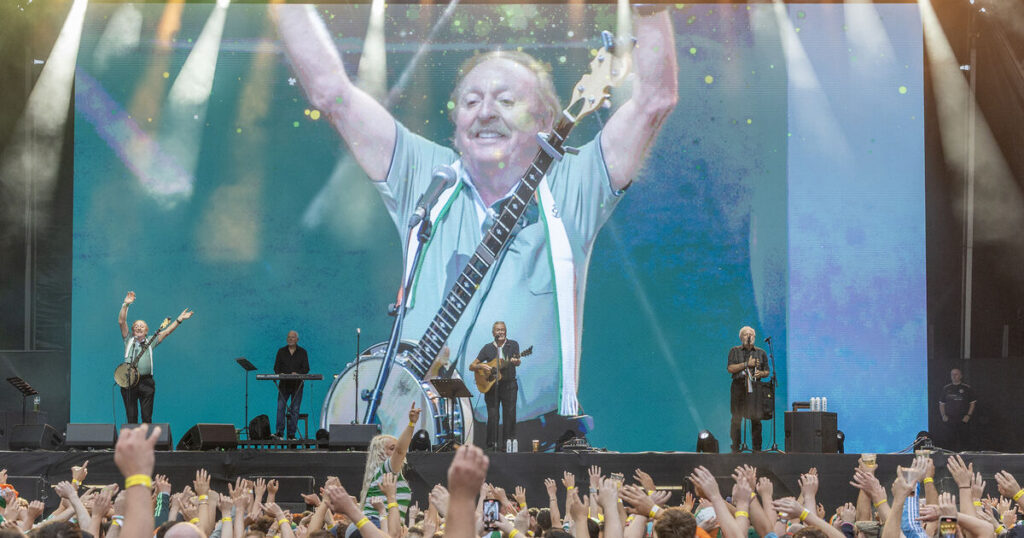The end of an era is the only way to describe the final ever live performance by The Wolfe Tones, and the trio at its core used their last concert to call for peace in Palestine, peace in Ireland, and also took a swipe at “British propaganda” in the 1980s.
After just over six decades together, the legendary Irish balladeers, who first announced their retirement at the end of 2023, said a final farewell to their fans as a summer heatwave broke in Thomond Park. Fans danced and sang in the rain, not allowing the weather to dampen the celebrations of a 60-year career.
Limerick City was a sea of green on Sunday evening as 29,000 fans made the pilgrimage to the sold-out rugby stadium for the last time to see the rebel music band, the rainfall reflecting the tears of many of their devoted followers.
Those in the crowd had accents from all corners of Ireland and beyond and sported 40 shades of green, Celtic ponchos, tricolour balaclavas a la Kneecap, and a spectrum of rain ponchos to the landmark event.
With support from Irish singer Dave Lofts and Scottish group Brógeal, the night in Thomond was a retirement do like no other. Taking to the stage at 8.15pm, Noel Nagle, Brian Warfield and Tommy Byrne were visibly emotional at the culmination of their musical career together, not least after some high-profile messages on the big screen.
They came on stage after a recorded message from Mary Lou McDonald thanking them for being “true rebels, true patriots” and singing the opening of , before Kellie Harrington thanked them for teaching Irish people about their history. Kneecap also earned high-pitched cheers with their video tribute, which included the slogan “tiocfaidh ár lá”.
“We are proud to have told the story of Ireland for 61 years,” Warfield told the crowd, reflecting on their gigs in the US and Australia during the Troubles before singing their opening song My Heart Is In Ireland.
The band was not slow to call out international injustices during their swan song gig, and they called on Israel to return Palestine to the Palestinian people.
“The Wolfe Tones have always been concerned about people and peace in the world. I believe that Israel is going to cause the next world war,” Warfield said. “They must give over the land to the Palestinian people. God knows we see the suffering of the children there.
As they sang , several in the crowd held Palestinian flags aloft beside Irish tricolours.
“We have to fight for the people of Ireland,” Warfield said, citing hospital waiting lists as just one area he would like to see to. “The Wolfe Tones are finishing up tonight but I will continue to fight for the Irish people.
The setlist included some of their most beloved and best-known tunes, including , , , , and .
was another tune that had the crowd on their feet, with its notorious verse of ‘ooh ah, up the RA’, echoing around the stadium before the group settled into a calmer pace with the ever-popular, The Streets of New York.
A highlight reel from their decades-long career wouldn’t be complete without “the fastest-selling record in Ireland” at the time, 1973’s hit The Helicopter Song. Unsurprising, Sean South went down well with the Limerick crowd, who were back on their feet to honour the Garryowen man.
It was in a high-paced mash-up with The Broad Black Brimmer, Big Strong Man, Rock on Rockall, Irish Eyes Are Smiling, and Some Say the Devil is Dead.
They dedicated some time to the Easter Rising of 1916, paying tribute to James Connolly and Padraig Pease before telling “the greatest love story in the world” with , which ended with soloist Byrne bowing and thanking the crowd for their applause. His bandmate Warfield said he believes Byrne is “one of the greatest ballad singers in the world.
Before singing , which received the loudest and longest applause, Warfield said the British government spread “bullshit” about Irish people being terrorists at the time. Byrne said it is “the best song that I have ever sung”.
The Wolfe Tones ensured their fans were together as their musical journey came to an end and hoarse fans left Thomond Park with a call for Irish unity and ringing in their ears along with the knowledge that they had been witness to a major part of Ireland’s music history.


